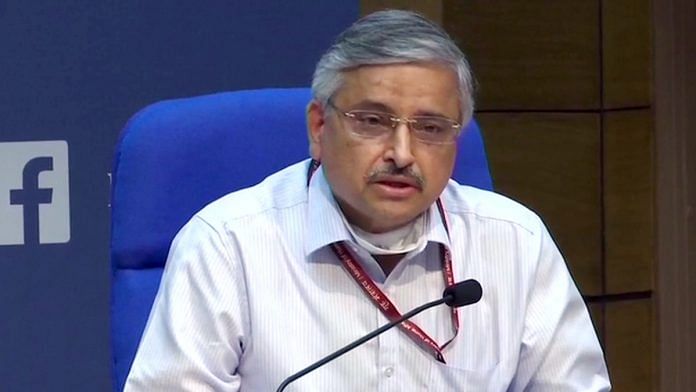New Delhi: India has done well with its testing strategy in the fight against Covid-19, and comparisons with a small country like South Korea shouldn’t be made over this, All India Institute of Medical Sciences (AIIMS) Director Dr Randeep Guleria has said.
In an interview to ThePrint Thursday, Guleria said, “We should not compare India with South Korea. We have a huge population. If we decide to test our 5 per cent population, we will need some 7 crore kits and no country in the world has these many right now.”
The World Health Organization’s mantra to fight the Covid-19 is ‘Test. Test. Test’.
As of Thursday, India has conducted just over 5 lakh tests, or about 363 per million people — three months after the first Covid-19 case appeared in the country. The total number of Covid positive cases in the country is just a hint above 23,000.
South Korea, which has around 10,700 cases, has conducted nearly 6 lakh tests — or about 11,500 per million people.
The AIIMS chief finds nothing wrong with these numbers. “India has a good testing strategy. We have increased the number of tests significantly. While the number of tests has gone up, the number of positive cases have not gone up in that proportion,” he said.
Citing this, he said India doesn’t need to test everyone.
Speaking about the strategy, Guleria said earlier only those with travel history were tested. Now, those with pneumonia symptoms and those in hotspots are also being tested. “Earlier, we were conducting a few hundred tests a day, now we have the capacity of 30,000 tests a day,” said Guleria.
While the number of cases has risen in the country, the AIIMS chief said the bright side is that a lot of patients are recovering from the disease. “One positive thing for India is that 90 per cent Covid patients are of very mild symptoms and they do not need the ventilator as well,” he said.
This has kept India’s death rate very low, he added. India has so far seen a death toll of 718.
He added that India won’t need to revise its death toll, unlike the US and China. These countries revised their estimates of death in New York and Wuhan, respectively, having added those who died outside hospitals to the number of Covid deaths.
Unlike other countries, India doesn’t have large-scale facilities like nursing homes or old-age homes, and this is why there won’t be any need to revise the numbers.
Also read: India’s high number of asymptomatic cases worrying, and herd immunity is far off
On issues with rapid tests
Speaking about the concerns with the rapid testing kits which some states have raised, AIIMS chief Randeep Guleria said there is no problem with them at all.
Guleria said the Indian Council of Medical Research has asked states to understand the utility of these kits. “There are two tests for Covid — RT-PCR and rapid test. While the first one finds the virus in the body, the second one finds antibodies in the blood,” he said.
The most important thing with rapid tests is its efficacy in field conditions, said Guleria, pointing to important factors for the success of kits. “There are so many things like the dropping of three drops of blood properly to keeping the kit in the right temperature,” he said.
On lockdown and comorbidities
Lauding India’s nationwide lockdown to fight the spread of Covid-19, the AIIMS chief said the country is doing better as compared to Western countries because of the move.
“Before lockdown, the cases in India would double in four to four and a half days. Now it takes some seven days,” said Dr Randeep Guleria.
Asked when India can lift the lockdown, he said this can’t be done overnight because there are too many risks. “This virus is very smart and this is a collective fight. To defeat it, we need to fight collectively,” he said.
With many experts debating if the warm weather will make any difference to the spread of the virus, Guleria said this hasn’t happened. “The temperature is above 30 degrees in most of the parts in India but it is still spreading. It is also spreading in a warm country like Brazil.”
Pointing towards another danger, he said comorbidities become fatal when combined with Covid. People with heart, kidney or lung problems are the most vulnerable and while they should be protected from Covid, their regular treatment must not stop, he said. “There can be ‘collateral damage’ from Covid in India. We have to strike a balance between the Covid and non-Covid cases.”
Guleria also said this is the point where India should become self-reliant in the medical sector. Currently, the country is heavily dependent on China, particularly for raw materials for drugs, or active pharmaceutical ingredients (APIs).
Also read: With lockdown exit uncertain, ‘inflation tax’ can help govt care for those without savings
On HCQ in India
Guleria also spoke about hydroxychloroquine (HCQ), which is being administered as prophylaxis (preventive drug) to healthcare workers in India.
India has been using this medicine for a very long time, and there are no side effects of it, he said, adding heart patients shouldn’t be given the drug.
“Certain reports have suggested that HCQ can stop coronavirus from replicating in an individual’s body. The medicine is being given to the medical staff as prophylaxis so that the replication of the virus does not happen when it enters their body,” said Guleria.
Asked about a new study that suggests there is no benefit of HCQ and a higher death rate has been seen in Covid-19 patients taking the drug, he said such studies will pave the way for the future use of HCQ in India.
Also read: 8 am to midnight, it’s ‘out-of-sight’ Amit Shah who’s quietly managing India’s Covid crisis



